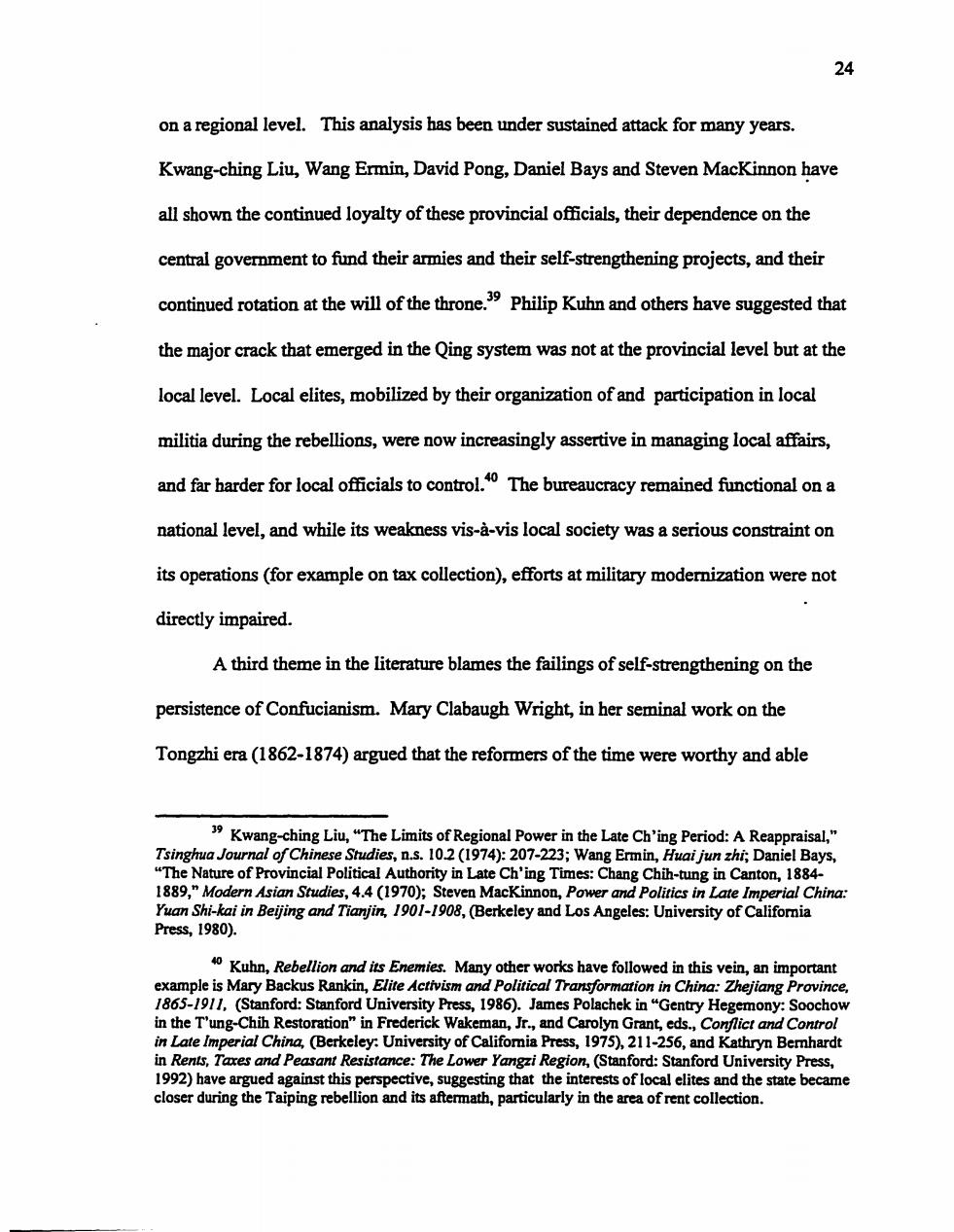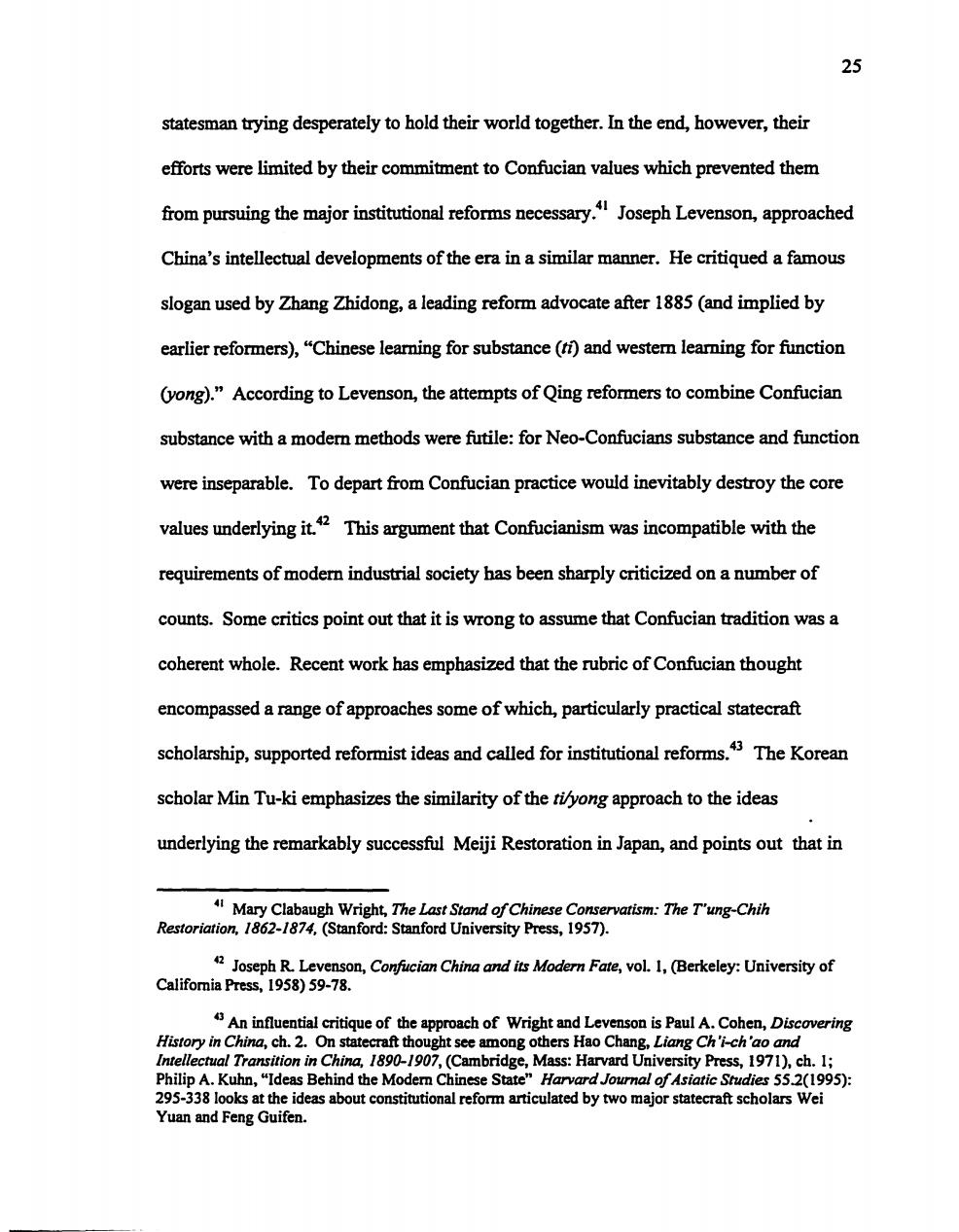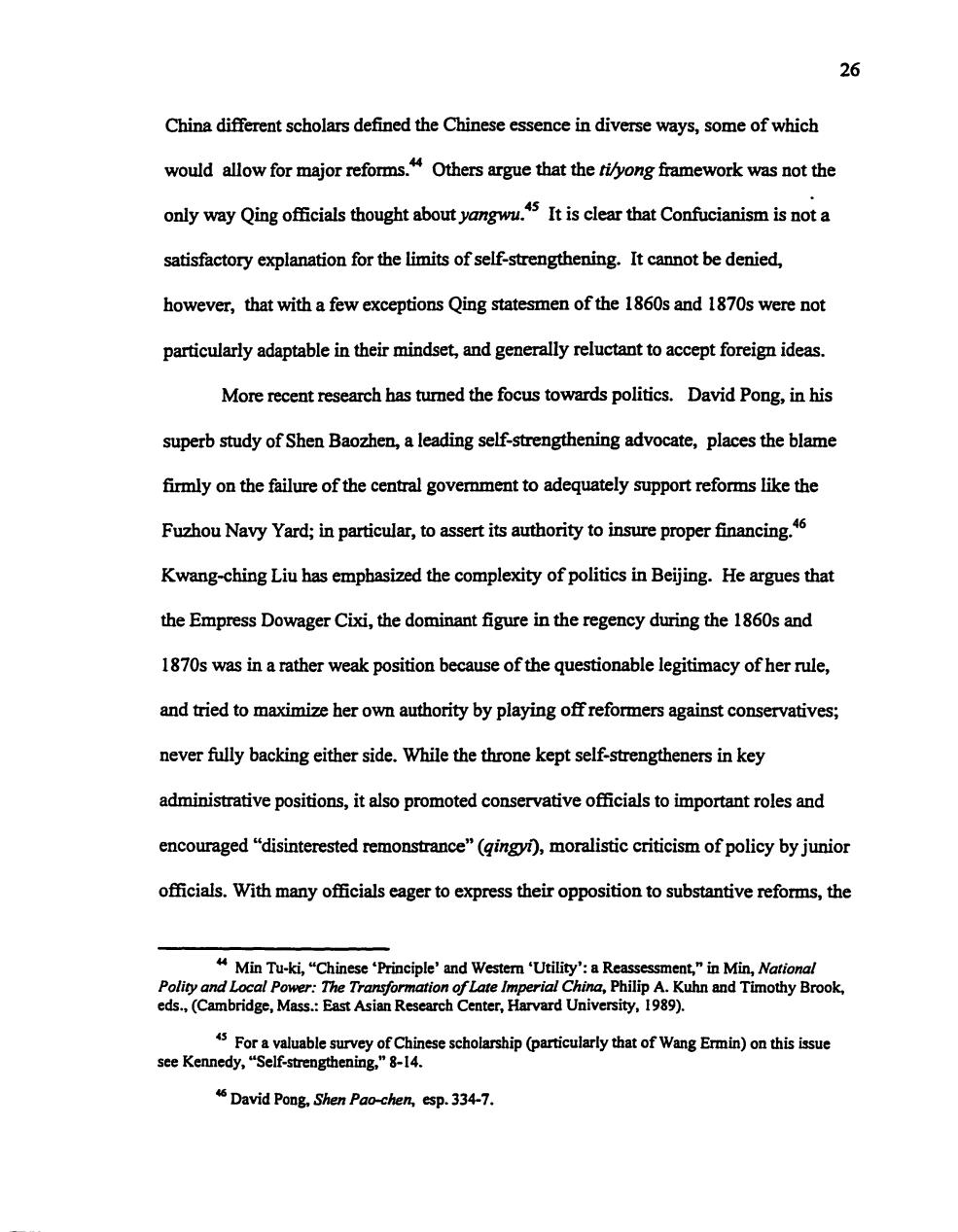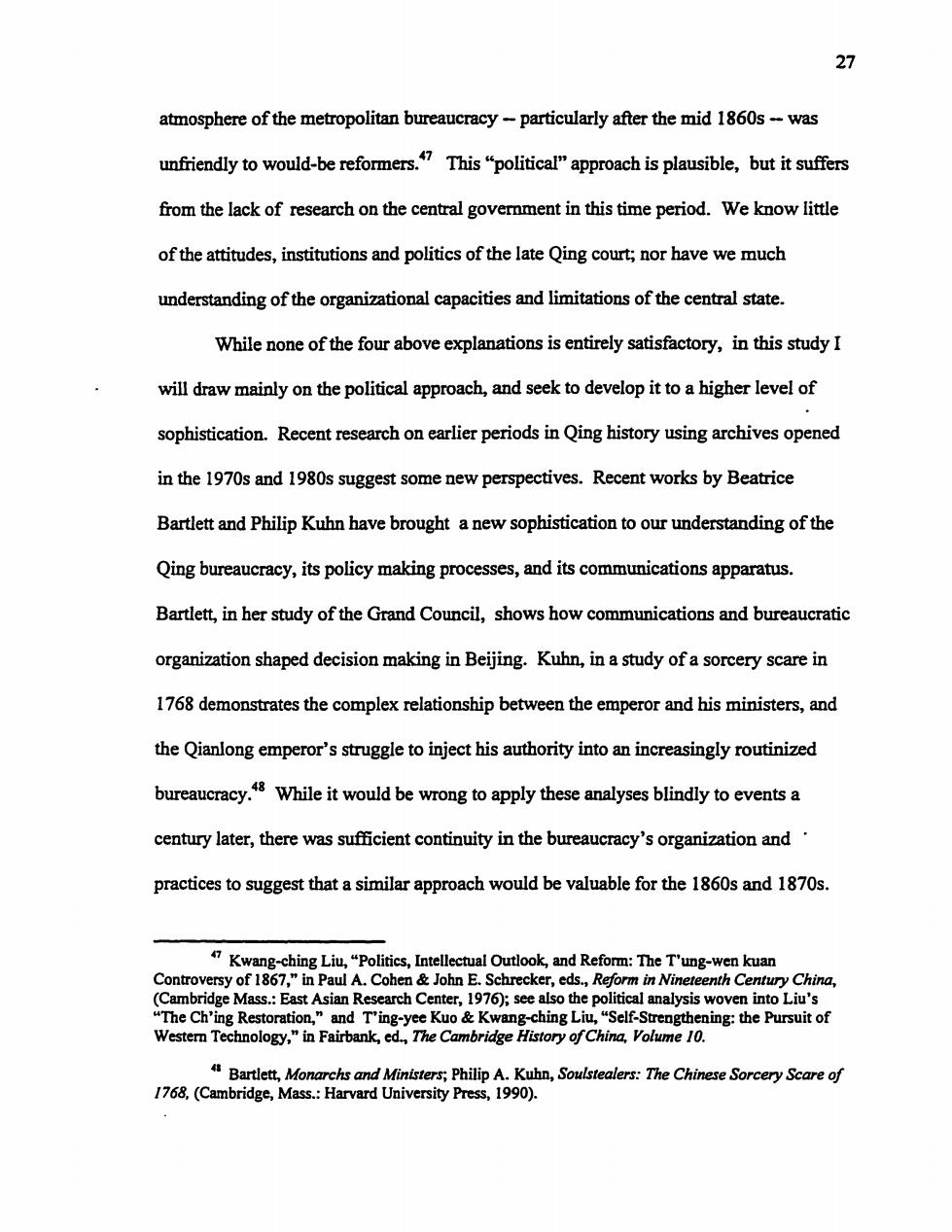
24 on a regional level.This analysis has been under sustained attack for many years. Kwang-ching Liu,Wang Ermin,David Pong,Daniel Bays and Steven MacKinnon have all shown the continued loyalty of these provincial officials,their dependence on the central government to fund their armies and their self-strengthening projects,and their continued rotation at the will of the throne.3 Philip Kuhn and others have suggested that the major crack that emerged in the Qing system was not at the provincial level but at the local level.Local elites,mobilized by their organization of and participation in local militia during the rebellions,were now increasingly assertive in managing local affairs, and far harder for local officials to control.The bureaucracy remained functional on a national level,and while its weakness vis-a-vis local society was a serious constraint on its operations(for example on tax collection),efforts at military modernization were not directly impaired. A third theme in the literature blames the failings of self-strengthening on the persistence of Confucianism.Mary Clabaugh Wright,in her seminal work on the Tongzhi era(1862-1874)argued that the reformers of the time were worthy and able Kwang-ching Liu,"The Limits of Regional Power in the Late Ch'ing Period:A Reappraisal," Tsinghua Journal ofChinese Studies,n.s.10.2(1974):207-223;Wang Ermin,Huai jun zhi;Daniel Bays, "The Nature of Provincial Political Authority in Late Ch'ing Times:Chang Chih-tung in Canton,1884- 1889,"Modern Asian Studies,4.4 (1970);Steven MacKinnon,Power and Politics in Late Imperial China: Yuan Shi-kai in Beijing and Tianjin,1901-1908,(Berkeley and Los Angeles:University of California Press,1980). 40 Kuhn,Rebellion and its Enemies.Many other works have followed in this vein,an important example is Mary Backus Rankin,Elite Activism and Political Transformation in China:Zhejiang Province, /865-19//,(Stanford:Stanford University Press,1986).James Polachek in "Gentry Hegemony:Soochow in the T'ung-Chih Restoration"in Frederick Wakeman,Jr.,and Carolyn Grant,eds.,Conflict and Control in Late Imperial China,(Berkeley:University of Califomia Press,1975),211-256,and Kathryn Berhardt in Rents,Taxes and Peasant Resistance:The Lower Yangzi Region,(Stanford:Stanford University Press, 1992)have argued against this perspective,suggesting that the interests of local elites and the state became closer during the Taiping rebellion and its aftermath,particularly in the area of rent collection
24 on a regional level. This analysis has been under sustained attack for many years. Kwang-ching Liu, Wang Ermin, David Pong, Daniel Bays and Steven MacKinnon ~ve all shown the continued loyalty of these provincial officials, their dependence on the central government to fund their armies and their self-strengthening projects, and their continued rotation at the will of the throne.39 Philip Kuhn and others have suggested that the major crack that emerged in the Qing system was not at the provincial level but at the local level. Local elites, mobilized by their organization of and participation in local militia during the rebellions. were now increasingly assertive in managing local affairs, and far harder for local officials to control. 40 The bureaucracy remained functional on a national level, and while its weakness vis-a.-vis local society was a serious constraint on its operations (for example on tax collection), efforts at military modernization were not directly impaired. A third theme in the literature blames the failings of self-strengthening on the persistence of Confucianism. Mary Clabaugh Wright, in her seminal work on the Tongzhi era (1862-1874) argued that the reformers of the time were worthy and able 39 Kwang-ching Liu, "The Limits of Regional Power in the Late eh'ing Period: A Reappraisal," Tsinghua Journal o/Chinese Studies, n.s. 10.2 (1974): 207-223; Wang Ermin, Huaijun zhi; Daniel Bays, "The Nature of Provincial Political Authority in Late Ch' ing Times: Chang Chih-tung in Canton, 1884- 1889," Modern Asian Studies, 4.4 (1970); Steven MacKinnon, Power and Politics in Late Imperial China: Yuan Shi-kai in Beijing and Tianjin. 1901-1908, (Berkeley and Los Angeles: University of California Press, 1980). 40 Kuhn, Rebellion and its Enemies. Many other works have followed in this vein, an important example is Mary Backus R.an.kin, Elite Activism and Political Transformation in China: Zhejiang Province. 1865-1911. (Stanford: Stanford University Press, 1986). James Polachek in "Gentry Hegemony: Soochow in the T'ung-Chih Restoration" in Frederick Wakeman, Jr., and Carolyn Grant, eds., Conflict and Control in Late Imperial China, (Berkeley: University of California Press, 1975),211-256, and Kathryn Bernhardt in Rents. Taxes and Peasant Resistance: The Lower Yangzi Region, (Stanford: Stanford University Press, 1992) have argued against this perspective, suggesting that the interests of local elites and the state became closer during the Taiping rebellion and its aftermath. particularly in the area of rent collection

25 statesman trying desperately to hold their world together.In the end,however,their efforts were limited by their commitment to Confucian values which prevented them from pursuing the major institutional reforms necessary.Joseph Levenson,approached China's intellectual developments of the era in a similar manner.He critiqued a famous slogan used by Zhang Zhidong,a leading reform advocate after 1885(and implied by earlier reformers),"Chinese learning for substance (ti)and western learning for function (vong)."According to Levenson,the attempts of Qing reformers to combine Confucian substance with a modern methods were futile:for Neo-Confucians substance and function were inseparable.To depart from Confucian practice would inevitably destroy the core values underlying it.This argument that Confucianism was incompatible with the requirements of modern industrial society has been sharply criticized on a number of counts.Some critics point out that it is wrong to assume that Confucian tradition was a coherent whole.Recent work has emphasized that the rubric of Confucian thought encompassed a range of approaches some of which,particularly practical statecraft scholarship,supported reformist ideas and called for institutional reforms.The Korean scholar Min Tu-ki emphasizes the similarity of the tiyong approach to the ideas underlying the remarkably successful Meiji Restoration in Japan,and points out that in AMary Clabaugh Wright,The Last Stand ofChinese Conservatism:The T'ung-Chih Restoriation,1862-1874,(Stanford:Stanford University Press,1957). Joseph R.Levenson,Confucian China and its Modern Fate,vol.,(Berkeley:University of Califoria Press,1958)59-78. An influential critique of the approach of Wright and Levenson is Paul A.Cohen,Discovering History in China,ch.2.On statecraft thought see among others Hao Chang,Liang Ch'i-ch'ao and Intellectual Transition in China,1890-1907,(Cambridge,Mass:Harvard University Press,1971),ch.1; Philip A.Kuhn,"Ideas Behind the Modern Chinese State"Harvard Journal of Asiatic Studies 55.2(1995): 295-338 looks at the ideas about constitutional reform articulated by two major statecraft scholars Wei Yuan and Feng Guifen
25 statesman trying desperately to hold their world together. In the end, however, their efforts were limited by their commitment to Confucian values which prevented them from pursuing the major institutional reforms necessary.41 Joseph Levenson, approached China's intellectual developments of the era in a similar manner. He critiqued a famous slogan used by Zhang Zhidong, a leading reform advocate after 1885 (and implied by earlier reformers), "Chinese learning for substance (h) and western learning for function (yong)." According to Levenson, the attempts ofQing reformers to combine Confucian substance with a modem methods were futile: for Neo-Confucians substance and function were inseparable. To depart from Confucian practice would inevitably destroy the core values underlying it. 42 This argument that Confucianism was incompatible with the requirements of modem industrial society bas been sharply criticized on a number of counts. Some critics point out that it is wrong to assume that Confucian tradition was a coherent whole. Recent work has emphasized that the rubric of Confucian thought encompassed a range of approaches some of which, particularly practical statecraft scholarship, supported reformist ideas and called for institutional reforms.43 The Korean scholar Min Tu-ki emphasizes the similarity of the tilyong approach to the ideas underlying the remarkably successful Meiji Restoration in Japan, and points out that in 41 Mary Clabaugh Wright. The Last Stand of Chinese Conservatism: The T'ung-Chih Restoriation, 1862-1874, (Stanford: Stanford University Press, 1957). 42 Joseph R. Levenson, Confucian China and its Modem Fate, vol. 1, (Berkeley: University of California Press, 1958) 59-78. 43 An influential critique of the approach of Wright and Levenson is Paul A. Cohen, Discovering History in China, ch. 2. On statecraft thought see among others Hao Chang, Liang Ch'i-ch 'QO and Intellectual Transition in China, 1890-1907, (Cambridge, Mass: Harvard University Press, 1971), ch. I; Philip A. Kuhn, "Ideas Behind the Modem Chinese State" Harvard Journal of Asiatic Studies 55.2(1995): 295-338 looks at the ideas about constitutional reform articulated by two major statecraft scholars Wei Yuan and Feng Guifen

26 China different scholars defined the Chinese essence in diverse ways,some of which would allow for major reforms.Others argue that the tivong framework was not the only way Qing officials thought about yangwu.5 It is clear that Confucianism is not a satisfactory explanation for the limits of self-strengthening.It cannot be denied, however,that with a few exceptions Qing statesmen of the 1860s and 1870s were not particularly adaptable in their mindset,and generally reluctant to accept foreign ideas. More recent research has turned the focus towards politics.David Pong,in his superb study of Shen Baozhen,a leading self-strengthening advocate,places the blame firmly on the failure of the central government to adequately support reforms like the Fuzhou Navy Yard;in particular,to assert its authority to insure proper financing. Kwang-ching Liu has emphasized the complexity of politics in Beijing.He argues that the Empress Dowager Cixi,the dominant figure in the regency during the 1860s and 1870s was in a rather weak position because of the questionable legitimacy of her rule, and tried to maximize her own authority by playing off reformers against conservatives; never fully backing either side.While the throne kept self-strengtheners in key administrative positions,it also promoted conservative officials to important roles and encouraged"disinterested remonstrance"(qingyi),moralistic criticism of policy by junior officials.With many officials eager to express their opposition to substantive reforms,the Min Tu-ki,"Chinese'Principle'and Wester 'Utility':a Reassessment,"in Min,National Polity and Local Power:The Transformation of Late Imperial China,Philip A.Kuhn and Timothy Brook, eds.,(Cambridge,Mass.:East Asian Research Center,Harvard University,1989). 5For a valuable survey of Chinese scholarship(particularly that of Wang Ermin)on this issue see Kennedy,"Self-strengthening,"8-14. David Pong,Shen Pao-chen,esp.334-7
China different scholars defined the Chinese essence in diverse ways, some of which would allow for major reforms.44 Others argue that the tilyong framework was not the only way Qing officials thought about yangwu.45 It is clear that Confucianism is not a satisfactory explanation for the limits of self-strengthening. It cannot be denied, however, that with a few exceptions Qing statesmen of the 1860s and 1870s were not particularly adaptable in their mindset, and generally reluctant to accept foreign ideas. More recent research has turned the focus towards politics. David Pong, in his superb study of Shen Baozhen, a leading self-strengthening advocate, places the blame firmly on the failure of the central government to adequately support reforms like the Fuzhou Navy Yard; in particular, to assert its authority to insure proper financing.46 Kwang-cbing Liu has emphasized the complexity of politics in Beijing. He argues that the Empress Dowager Coo, the dominant figure in the regency during the 1860s and 1870s was in a rather weak position because of the questionable legitimacy of her rule, and tried to maximize her own authority by playing off reformers against conservatives; never fully backing either side. While the throne kept self-strengtheners in key administrative positions, it also promoted conservative officials to important roles and 26 encouraged "disinterested remonstrance" (qingyz), moralistic criticism of policy by junior officials. With many officials eager to express their opposition to substantive reforms, the 44 Min Tu-ki, "Chinese 'Principle' and Western 'Utility': a Reassessment," in Min, National Polity and Local Power: The Transformation of Late Imperial China, Philip A. Kuhn and Timothy Brook, eds., (Cambridge, Mass.: East Asian Research Center, Harvard University, 1989). 4S For a valuable survey of Chinese scholarship (panicularly that of Wang Ermin) on this issue see Kennedy, "Self-strengthening," 8-14. 46 David Pong, Shen Pao-chen, esp.334-7

27 atmosphere of the metropolitan bureaucracy-particularly after the mid 1860s--was unfriendly to would-be reformers.7 This"political"approach is plausible,but it suffers from the lack of research on the central government in this time period.We know little of the attitudes,institutions and politics of the late Qing court;nor have we much understanding of the organizational capacities and limitations of the central state While none of the four above explanations is entirely satisfactory,in this study I will draw mainly on the political approach,and seek to develop it to a higher level of sophistication.Recent research on earlier periods in Qing history using archives opened in the 1970s and 1980s suggest some new perspectives.Recent works by Beatrice Bartlett and Philip Kuhn have brought a new sophistication to our understanding of the Qing bureaucracy,its policy making processes,and its communications apparatus. Bartlett,in her study of the Grand Council,shows how communications and bureaucratic organization shaped decision making in Beijing.Kuhn,in a study of a sorcery scare in 1768 demonstrates the complex relationship between the emperor and his ministers,and the Qianlong emperor's struggle to inject his authority into an increasingly routinized bureaucracy.While it would be wrong to apply these analyses blindly to events a century later,there was sufficient continuity in the bureaucracy's organization and practices to suggest that a similar approach would be valuable for the 1860s and 1870s. 7 Kwang-ching Liu,"Politics,Intellectual Outlook,and Reform:The T'ung-wen kuan Controversy of 1867,"in Paul A.Cohen John E.Schrecker,eds.,Reform in Nineteenth Century China, (Cambridge Mass.:East Asian Research Center,1976);see also the political analysis woven into Liu's "The Ch'ing Restoration,"and T'ing-yee Kuo Kwang-ching Liu,"Self-Strengthening:the Pursuit of Western Technology,"in Fairbank,ed.,The Cambridge History ofChina,Volume 10. 4 Bartlett,Monarchs and Ministers;Philip A.Kuhn,Soulstealers:The Chinese Sorcery Scare of 1768,(Cambridge,Mass.:Harvard University Press,1990)
27 atmosphere of the metropolitan bureaucracy - particularly after the mid 1860s - was unfriendly to would-be reformers.47 This "political" approach is plausible, but it suffers from the lack of research on the central government in this time period. We know little of the attitudes, institutions and politics of the late Qing court; nor have we much understanding of the organizational capacities and limitations of the central state. While none of the four above explanations is entirely satisfactory, in this study I will draw mainly on the political approach, and seek to develop it to a higher level of sophistication. Recent research on earlier periods in Qing history using archives opened in the 1970s and 1980s suggest some new perspectives. Recent works by Beatrice Bartlett and Philip Kuhn have brought a new sophistication to our understanding of the Qing bureaucracy, its policy making processes, and its communications apparatus. Bartlett, in her study of the Grand Council, shows how communications and bureaucratic organization shaped decision making in Beijing. Kuhn, in a study of a sorcery scare in 1768 demonstrates the complex relationship between the emperor and his ministers, and the Qianlong emperor's struggle to inject his authority into an increasingly routinized bureaucracy.48 While it would be wrong to apply these analyses blindly to events a century later, there was sufficient continuity in the bureaucracy's organization and . practices to suggest that a similar approach would be valuable for the 1860s and 1870s . • 7 Kwang-ching Liu. "Politics, Intellectual Outlook, and Reform: The T'ung-wen kuan Controversy of 1867," in Paul A. Cohen &: John E. Schrecker, eds., Reform in Nineteenth Century Chino, (Cambridge Mass.: East Asian Research Center, 1976); see also the political analysis woven into Liu's "The Ch'ing Restoration," and T'ing-yee Kuo &: Kwang-cbing Lillo "Self-Strengthening: the Pursuit of Western Technology," in Fairbank, ~ The Camb,.idge History o/Chino, Volume 10 . • 1 Bartlett, Monarchs and Ministers; Philip A. Kuhn, Soulstealers: The Chinese Sorcery Scare of 1768, (Cambridge, Mass.: Harvard University Press, 1990)

28 Another theme in recent research is a focus on factions or informal groups within the political system and networks of politically active literati elites outside of it.James Polachek,in a study of Opium War politics,argues that political infighting among. informal groups of literati produced extremist positions and sharp changes in direction in Qing foreign policy.Elsewhere Polachek has argued that an elites from Suzhou in Jiangsu province were able to use their political connections to parlay their support of Li Hongzhang's military in retur for virtually a free hand in exploiting local peasantry. William Rowe has shown in an analysis of the politics of water control in Hubei in the 1870s and 1880s that politically active local elites with strong connections within the bureaucracy were able to get a hearing for their positions at the highest level,a process facilitated by the competition among factions within the bureaucracy.Where Polachek sees such literati politics as hypocritical,self-interested and ultimately exploitative, Rowe concludes that it shows"a remarkably pluralist system of interest group politics," suggesting that such political engagement by local elites was leading China toward a less despotic system of goverance.0 However one chooses to view it,these works show that rivalries among informal groups of officials and their connections in society at large could have a profound impact on political activity in the late Qing period. Looked at in the abstract,the state making model suggests a rational response of state elites to the pressures they face.In a competitive state system they build better James M.Polachek,The Inner Opium War,(Cambridge,Mass.:Harvard University Press, 1992);and "Gentry Hegemony:Soochow in the T'ung-chih Restoration." William T.Rowe,"Water Control and the Qing Political Process:The Fankou Dam Controversy,1876-1883"Modern China 14.4 (1988):353-387,the quote is from 354
28 Another theme in recent research is a focus on factions or informal groups within the political system and networks of politically active literati elites outside of it. James Polachek, in a study of Opium War politics, argues that political infighting among . informal groups of literati produced extremist positions and sharp changes in direction in Qing foreign policy. Elsewhere Polachek has argued that an elites from Suzhou in Jiangsu province were able to use their political connections to parlay their support of Li Hongzhang's military in return for virtually a free hand in exploiting local peasantry.49 William Rowe has shown in an analysis of the politics of water control in Hubei in the 18705 and 1880s that politically active local elites with strong connections within the bureaucracy were able to get a hearing for their positions at the highest level, a process facilitated by the competition among factions within the bureaucracy. Where Polachek sees such literati politics as hypocritical, self-interested and ultimately exploitative, Rowe concludes that it shows "a remarkably pluralist system of interest group politics," suggesting that such political engagement by local elites was leading China toward a less despotic system of governance. so However one chooses to view it, these works show that rivalries among informal groups of officials and their connections in society at large could have a profound impact on political activity in the late Qing period. Looked at in the abstract, the state making model suggests a rational response of state elites to the pressures they face. In a competitive state system they build better 49 lames M. Polachek, The Inner Opium War, (Cambridge, Mass.: Harvard University Press, 1992); and "Gentry Hegemony: Soochow in the T'ung-chih Restoration." 50 William T. Rowe, "Water Control and the Qing Political Process: The Fankou Dam Controversy, 1876-1883" Modem China 14.4 (1988): 353-387, the quote is from 354